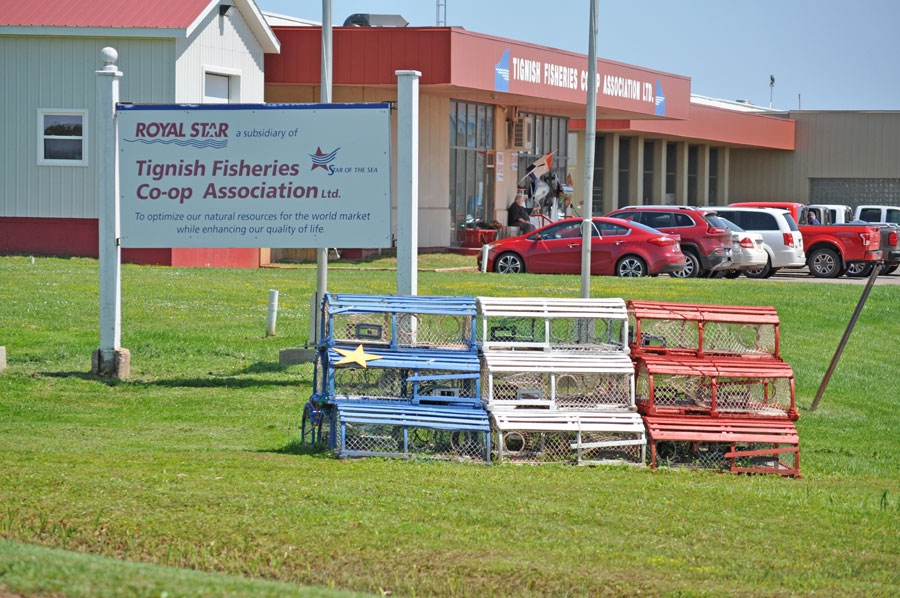Tignish fishing plant taking simple but effective actions to make a difference and reduce plastics and food waste
Ask Francis Morrissey about protecting our environment for future generations of Islanders and you are likely to hear a passionate reply that shows he is more than ready to take steps to live a greener life. And that attitude extends directly to his role as manager at Royal Star Foods in Tignish.
“I think I have about a hundred re-useable grocery bags at home now, but I am game to keep buying them till I finally learn,” Morrissey said. “I am a firm believer that we can be trained to do better, and I am a big supporter of any policy that helps reduce stress on the environment.”

Thousands of single-use plastic water bottles are diverted with the use of the water dispenser
Measures undertaken at Royal Star Foods, the fisher-owned plant that employs approximately 400, range from significant power-saving initiatives to hands-on measures led by plant workers and fishers.
Morrissey is probably most proud of a recent initiative when Royal Star Foods provided reusable water bottles to all staff and installed a filtered water dispenser that has been counting the number of single-use plastic bottles that have been removed from the waste/recycling stream. “Since April, by filling up their bottles at our fountain, our staff have ensured that an amazing 14,200 plastic water bottles have been replaced by reusable bottles and cups,” Morrissey said. Update that to over 15,678 bottles as of printing, and you have a significant impact on the environment.
While plant management may have taken the lead with installation of the water dispenser, it is apparent that staff are getting on board. In fact they seem to have caught the ‘green bug’ and have recently started a composting program. Two employees have been assigned responsibility for the project and the resulting compost will be the base for flower beds next spring that will be designed to attract bees and butterflies as well as grow vegetables for all.
Royal Star Foods is owned by 175 local fishers and is a subsidiary of the Tignish Fisheries Co-op Association Ltd. The fishers themselves are just as committed to greening up their fishing practices. All boats at this fisher-owned plant use biodegradable bilge socks–the socks collect the oil on the top of the bilge water, allowing clean water to be pumped out into the ocean.
As of fall 2019, 65 percent of boats serving the Royal Star Foods plant meet Tier 4 diesel emissions standard, which is the strictest standard for off-highway diesel engines. This requirement regulates the amount of particulate matter (PM), or black soot, and nitrogen oxides (NOx) that can be emitted from an off-highway diesel engine.
The fishers are also well aware of environmental concerns regarding gear lost due to storms or other situations. They are actively looking for solutions to reduce rope and other materials that could cause entanglements and sometimes fishers return to the water after the season to seek out “ghost gear” that could include missing traps, buoys, and ropes.
Royal Star Foods is one of Eastern Canada’s largest seafood processing plants. Within its 75,000 square feet are two processing areas, three styles of freezers, cold storage with a capacity of two million pounds, a dry storage area, as well as an on-site 400,000-pound refrigerated live holding area for lobsters. As you can imagine, all that equipment consumes vast amounts of electricity, and Morrissey is proud to say that 37 percent of their power comes from wind energy.
The Wind Energy Institute of Canada has recently received support from ACOA to conduct research to help the Tignish Harbour Authority and Tignish Fisheries/Royal Star Foods explore green energy alternatives. Besides the 60 or more street lights that illuminate the area, many of the boats require nighttime power for their electronics and other equipment. It is estimated that the port and Royal Star Foods combined consume about 1.5 million liters of diesel and about $750,000 worth of electricity annually.
A possible solution could involve a partnership with Tignish Harbour Authority. The Royal Star Foods plant has enough land to locate two wind turbines. Some of the power generated could be purchased by Royal Star Foods, with the resulting revenue to the Harbour Authority directed to port improvements beneficial to the fishers. In the end, 80 percent of the plant’s energy consumption could be derived from renewable energy sources if that project goes ahead.

Royal Star Foods manager Francis Morrissey stands beside the company’s water bottle filling station
Morrissey is known for his innovative solutions to challenges. He is very intrigued by the current evolution toward more environmentally friendly serving and packaging materials in the food sector and is observing new developments in Europe and Asia. He is now investigating ways to eliminate as much plastic as possible and, where feasible, replace it with biodegradable materials. While no major changes in this aspect of plant management are underway at this time, Morrissey hinted that he hopes to know more by next spring.
Morrissey not only loves to talk about today’s environmental concerns, he is sincere about doing whatever he and Royal Star Foods can to protect the environment for his four grandchildren–and he is actually taking action to implement eco-friendly and practical solutions for this major PEI food-processing operation.
- ROYAL STAR FOODS FOCUSES ON ENVIRONMENT - December 2, 2019
- TO SEE THE WORLD IN…AN OYSTER SHELL - October 1, 2019
- SEAFOOD EXPRESS MOVES MORE - August 1, 2019
- Shellfish Venture in Souris - October 1, 2018
- SUMMER’S NOT OVER AND NEITHER IS LOBSTER SEASON - August 1, 2018


